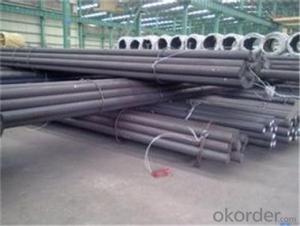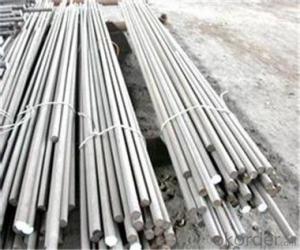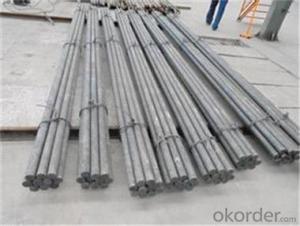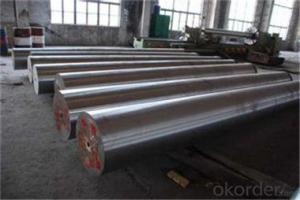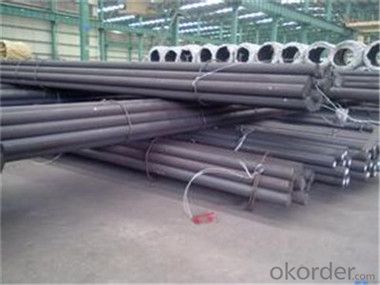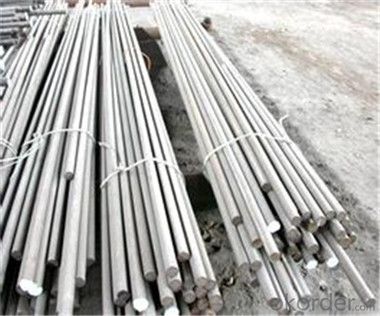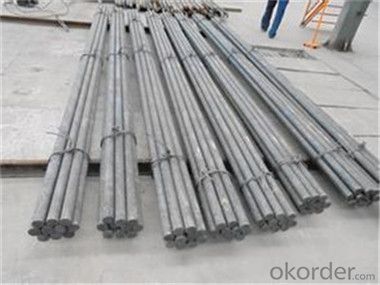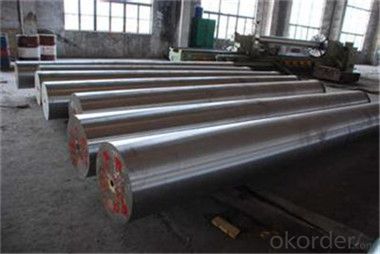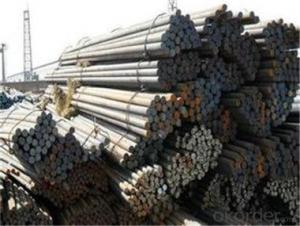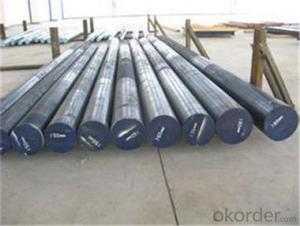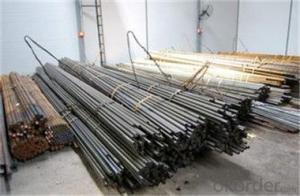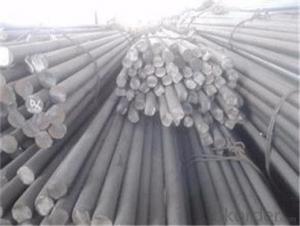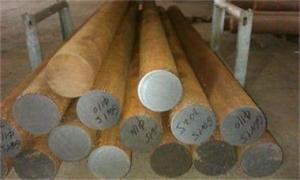Hard Chrome Carbon Steel Round Bar with Good Quality CNBM
- Loading Port:
- Tianjin
- Payment Terms:
- TT OR LC
- Min Order Qty:
- 990 m.t.
- Supply Capability:
- 2000000 m.t./month
OKorder Service Pledge
OKorder Financial Service
You Might Also Like
Description of steel round bar:
1.Diameter 80 to 800 mm
2.Black or Bright surface
3.Annealed or Quenched and tempered provided
4.Cutting service provide
Festures of steel round bar:
4340 Forged Round Steel Bar
1.Dia 80-800mm Length:2000-13000mm or as required
2.Technique:Forged
3.Delivery Time:45 days
Specifications of steel round bar:
Description |
Carbon Steel Rod/Carbon Steel Bar,carbon steel rod,carbon steel shaft,mild steel bar, mild steel shaft,ms bar | |
Material | ASTM | 1005,1006,1008,1010,1015,1020,1025,1030,1035,1040,1045,1050,1055,1060,1065,1070,1080,1084, 1016,1022 |
DIN | Ck10,Ck15,Ck22,Ck25,Ck30,Ck35,Ck40,Ck45,Ck50, 30Mn4,40Mn4 | |
BS | 040A04,095M15,045M10,080A40,045M10,080M50 | |
Standard | GB/T799,ASTM A29,A108,A321,A575,BS970,DIN1652,JIS G4051 | |
Section shape |
Round | |
Length |
As your required | |
Application | Carbon steel rod applies to chemical industry, shipping industry, manufacturing industry,construction,decorate Industry,electric power, pump shafts, sanitary wares,furniture handles,boiler,high temperature resistant,low temperature resistant, corrosion resistant. | |
Images of steel round bar:
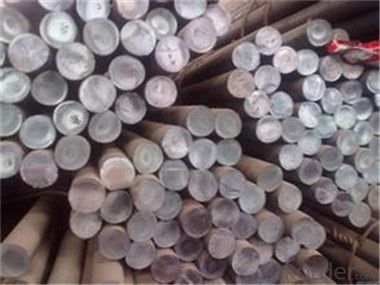
FAQ:
1. What is your package?
Packing situation: standard seaworthy packing or as customer required.
2. How long is the lead time?
Delivery time: 45 days after order confirmed.
3. What payment term do you accept?
Payment: T/T or L/C at sight.
- Q: What is the difference between a rough turned and a hot rolled steel round bar?
- A rough turned steel round bar is a type of steel bar that has been partially machined to remove imperfections and excess material, leaving a rough surface finish. This process helps to refine the dimensions and shape of the bar, making it more accurate and consistent. On the other hand, a hot rolled steel round bar is a type of steel bar that has been heated to high temperatures and then passed through a series of rollers to achieve the desired shape and size. This process results in a smooth surface finish and provides a uniform grain structure, which enhances the strength and durability of the steel. In summary, the main difference between a rough turned and a hot rolled steel round bar lies in the surface finish and manufacturing process used to produce them.
- Q: What are the weight calculations for steel round bars?
- The weight calculations for steel round bars can be determined using a straightforward formula. The weight of a steel round bar can be calculated by multiplying the square of the diameter in millimeters by the length in meters and then multiplying the result by the specific weight of steel, which is typically around 7.85 grams per cubic centimeter. The formula for calculating the weight of a steel round bar is as follows: Weight = (Diameter^2 x Length x Specific Weight of Steel) / 1000 Where: - Diameter is the diameter of the round bar in millimeters - Length is the length of the round bar in meters - Specific Weight of Steel is the density of steel, which is usually 7.85 grams per cubic centimeter - 1000 is used to convert the weight from grams to kilograms It is important to note that this formula assumes the round bar is made of pure steel and does not account for any variations in the specific weight of different steel alloys. Additionally, it is crucial to use consistent units throughout the calculation, either millimeters or meters, to obtain accurate results.
- Q: How are steel round bars used in the manufacturing of valves and fittings?
- Steel round bars are commonly used in the manufacturing of valves and fittings due to their strength, durability, and versatility. These round bars serve as the primary raw material for various components of valves and fittings. One crucial application of steel round bars in valve manufacturing is the production of valve stems. Valve stems are responsible for controlling the flow of fluids or gases through the valve. The round bars are machined and threaded to create the stem, which connects to the valve disc or plug. Steel round bars are chosen for this purpose because of their high tensile strength, which ensures the stem can withstand the pressure and torque required to operate the valve. In fittings manufacturing, steel round bars are commonly used to produce threaded connectors, nipples, and couplings. These components are essential for joining pipes or tubes together, allowing for fluid or gas transfer in various systems. Steel round bars are easily machinable, enabling manufacturers to create precise threads and shapes required for these fittings. Furthermore, steel round bars are also used to fabricate the body or housing of valves and fittings. The bars can be cut, forged, or machined into the desired shape, providing a sturdy and reliable structure for the valve or fitting. The use of steel in the body ensures the component's ability to withstand high pressures, temperature variations, and corrosive environments. Overall, steel round bars play a vital role in the manufacturing of valves and fittings. Their strength, durability, and machinability make them an excellent choice for creating critical components such as valve stems, threaded connectors, and the bodies of valves and fittings.
- Q: What are the advantages of using tungsten-alloy steel round bars?
- Tungsten-alloy steel round bars offer several advantages over other materials, making them a popular choice in various industries. Firstly, tungsten-alloy steel round bars have exceptional strength and durability. The addition of tungsten to the steel composition significantly improves its hardness and toughness, making it highly resistant to wear, deformation, and fatigue. This enhanced strength ensures that tungsten-alloy steel round bars can withstand heavy loads and high-pressure applications, making them ideal for use in industries such as aerospace, automotive, and construction. Another advantage of using tungsten-alloy steel round bars is their excellent heat resistance. Tungsten has one of the highest melting points among all elements, making it highly suitable for applications that involve extreme temperatures, such as furnace parts, cutting tools, and high-speed machinery. The heat resistance of tungsten-alloy steel round bars allows them to maintain their structural integrity and performance even in demanding environments, minimizing the risk of deformation or failure. Furthermore, tungsten-alloy steel round bars have superior corrosion resistance. The addition of tungsten to the steel alloy forms a protective oxide layer on the surface, which acts as a barrier against corrosive elements, moisture, and chemicals. This corrosion resistance makes tungsten-alloy steel round bars ideal for applications in marine environments, chemical processing plants, and oil and gas industries, where exposure to corrosive substances is common. Additionally, tungsten-alloy steel round bars provide excellent machinability. The hardness and toughness of these bars make them easy to shape, cut, and drill, allowing for precise machining and tight tolerances. This machinability makes tungsten-alloy steel round bars suitable for manufacturing intricate components and parts that require high precision and accuracy. Lastly, tungsten-alloy steel round bars have a high density, which gives them unique properties such as improved radiation shielding capabilities. This makes them valuable in industries where radiation protection is crucial, such as nuclear power plants, medical equipment, and aerospace applications. In conclusion, the advantages of using tungsten-alloy steel round bars include exceptional strength and durability, excellent heat resistance, superior corrosion resistance, excellent machinability, and high density for radiation shielding. These advantages make tungsten-alloy steel round bars a reliable and versatile choice for various industries, ensuring optimal performance and longevity in challenging environments.
- Q: Can steel round bars be used in the manufacturing of kitchenware?
- Yes, steel round bars can be used in the manufacturing of kitchenware. Steel is a durable and versatile material that is commonly used in the production of kitchen utensils and cookware. Steel round bars can be shaped and molded into various kitchenware items such as pots, pans, knives, spoons, and forks. The strength and heat resistance of steel make it suitable for cooking and food preparation purposes. Additionally, steel is easy to clean, hygienic, and resistant to corrosion, making it ideal for use in kitchenware.
- Q: How are steel round bars used in the construction of bridges and buildings?
- Steel round bars are widely used in the construction of bridges and buildings due to their strength, durability, and versatility. These bars are typically made of carbon steel and have a circular cross-section, making them perfect for structural applications. In bridge construction, steel round bars are commonly used for reinforcing concrete structures. They are often embedded within concrete beams, columns, and slabs to enhance their load-bearing capacity and resist bending and shearing forces. The bars are placed strategically in the concrete to provide tensile strength, which complements the compressive strength of the concrete. This reinforcement ensures that the bridge can withstand heavy loads and traffic while maintaining its structural integrity. Similarly, in building construction, steel round bars play a crucial role in reinforcing concrete structures. They are commonly used in the construction of columns, beams, and foundations to increase their load-carrying capacity and prevent structural failure. The bars are typically added to the concrete during the pouring process, forming a sturdy framework that enhances the building's strength and stability. Moreover, steel round bars are also used to create steel frames in the construction of buildings. These frames provide the skeletal structure of the building and support the weight of the floors, walls, and roofs. Steel round bars, due to their high strength-to-weight ratio, are ideal for creating lightweight yet robust frames that can withstand various loads, including wind and seismic forces. Additionally, steel round bars are used for other purposes in construction, such as the fabrication of steel reinforcements, connectors, and fasteners. They can be welded, bolted, or threaded to join different structural elements together, ensuring a secure and sturdy construction. Overall, steel round bars are an essential component in the construction of bridges and buildings. They provide the necessary strength, durability, and flexibility required to create structurally sound and long-lasting structures.
- Q: What are the advantages of using vanadium-alloy steel round bars?
- Vanadium-alloy steel round bars offer numerous benefits. Firstly, they possess significantly enhanced strength and toughness compared to regular steel, making them ideal for applications requiring durability and high strength, such as construction, manufacturing, and engineering projects. The inclusion of vanadium improves the steel's ability to withstand heavy loads, impacts, and extreme temperatures, enabling it to thrive in demanding environments. Secondly, vanadium-alloy steel round bars display exceptional resistance to corrosion. The vanadium creates a protective oxide layer on the steel's surface, preventing rusting and corrosion. Consequently, these bars have impressive longevity, even in harsh or corrosive surroundings. Moreover, vanadium-alloy steel exhibits excellent weldability and machinability. It can be effortlessly welded, facilitating efficient fabrication and construction processes. Additionally, its machinability allows for precise shaping and forming, making it adaptable to various design requirements. Furthermore, vanadium-alloy steel excels in wear resistance. This quality is particularly advantageous in applications where the bars face high levels of friction, abrasion, or wear, such as mining or manufacturing equipment. The addition of vanadium enhances the steel's hardness and wear resistance, thereby extending the lifespan of the bars and reducing maintenance costs. Lastly, vanadium-alloy steel demonstrates exceptional heat resistance. It can endure high temperatures without compromising its strength or structural integrity. Consequently, it is suitable for applications involving exposure to extreme heat, such as automotive engines, turbines, or power generation equipment. In conclusion, the utilization of vanadium-alloy steel round bars provides a range of advantages, including increased strength and toughness, corrosion resistance, ease of welding and machining, impressive wear resistance, and high heat resistance. These qualities establish vanadium-alloy steel round bars as a dependable and versatile choice for various applications.
- Q: How do steel round bars compare to wrought iron bars?
- Steel round bars and wrought iron bars have several differences that set them apart. Firstly, steel round bars are made from an alloy of iron and carbon, whereas wrought iron bars are composed of pure iron with a low carbon content. This difference in composition leads to varying properties. Steel round bars are known for their strength and durability, making them suitable for a wide range of applications, including construction, manufacturing, and engineering. On the other hand, wrought iron bars are softer and more malleable, allowing them to be easily shaped and formed into intricate designs. This characteristic makes wrought iron bars popular in decorative applications such as gates, fences, and ornamental pieces. Another difference lies in their manufacturing processes. Steel round bars are typically produced through hot rolling, which involves heating the steel billet and passing it through a series of rollers to shape it into the desired round bar form. In contrast, wrought iron bars are made through a labor-intensive process called blacksmithing. This involves heating the iron and repeatedly hammering it to remove impurities and create a fibrous structure, resulting in its characteristic grainy appearance. In terms of cost, steel round bars are generally more affordable compared to wrought iron bars. The manufacturing process for steel is more streamlined and efficient, leading to lower production costs. Wrought iron bars, on the other hand, require more time and labor, making them more expensive. Finally, when it comes to corrosion resistance, steel round bars have an advantage. Steel can be further alloyed with elements such as chromium, nickel, and molybdenum to enhance its resistance to rust and corrosion. This makes steel round bars suitable for outdoor applications where they may be exposed to moisture and harsh environmental conditions. Wrought iron bars, although they possess some level of corrosion resistance, are more prone to rusting and require regular maintenance to prevent deterioration. In conclusion, steel round bars and wrought iron bars differ in terms of composition, strength, manufacturing process, cost, and corrosion resistance. The choice between the two will depend on the specific requirements of the application, with steel round bars being favored for their strength and affordability, while wrought iron bars are often chosen for their malleability and decorative appeal.
- Q: What is the resistance to wear of a steel round bar?
- The wear resistance of a steel round bar can vary depending on several factors, including the type of steel used, hardness, surface finish, and any coatings or treatments applied. Steel is widely recognized for its exceptional wear resistance and ability to withstand abrasion and friction. Steel possesses inherent durability and strength, making it resistant to wear from repeated or prolonged contact with other surfaces. Its hardness and strength allow it to resist deformation, chipping, or cracking, even in high-stress situations. This quality makes steel round bars suitable for applications involving heavy loads, constant movement, or abrasive environments. However, it is important to acknowledge that external factors can still influence the wear resistance of a steel round bar. For instance, exposure to corrosive environments or improper handling and maintenance can compromise its wear resistance. In such cases, corrosion or surface damage may occur, resulting in a decrease in overall wear resistance. To enhance the wear resistance of a steel round bar, additional measures can be taken. Heat treatments like quenching and tempering can be employed to improve the hardness and strength of the steel, thereby increasing wear resistance. Furthermore, coatings such as chrome plating or nitriding can be utilized to provide an extra layer of protection against wear, reducing friction and extending the lifespan of the steel round bar. In conclusion, steel round bars generally exhibit high wear resistance due to their inherent durability and strength. However, factors such as steel type, surface finish, coatings, and environmental conditions can impact wear resistance. Proper selection, handling, and maintenance of the steel round bar are crucial to ensuring optimal wear resistance and prolonging its lifespan.
- Q: Can steel round bars be coated?
- Yes, steel round bars can be coated. Coating steel round bars provides several benefits, including improved corrosion resistance, enhanced durability, and increased aesthetic appeal. The most common types of coatings for steel round bars include galvanized coatings, epoxy coatings, and powder coatings. Galvanized coatings involve the application of a layer of zinc to the surface of the steel, which provides excellent corrosion protection. Epoxy coatings are typically used for industrial applications as they offer superior chemical resistance and can withstand harsh environments. Powder coatings involve the application of a dry powder electrostatically, which is then cured under heat to form a hard, protective layer. These coatings can be applied to steel round bars to protect them from rust and other forms of corrosion, making them suitable for a wide range of applications in various industries such as construction, manufacturing, and automotive.
Send your message to us
Hard Chrome Carbon Steel Round Bar with Good Quality CNBM
- Loading Port:
- Tianjin
- Payment Terms:
- TT OR LC
- Min Order Qty:
- 990 m.t.
- Supply Capability:
- 2000000 m.t./month
OKorder Service Pledge
OKorder Financial Service
Similar products
Hot products
Hot Searches
Related keywords
